If your mind’s been going blank, this edition explains the reset behind it, shows how to turn swirl into story with expressive writing, and offers a small-fix ritual to start your week steady.
Today’s Quick Overview:
🔬Science Spotlight: What happens when your mind goes blank...
🛠️ Tool of The Week: Expressive writing, or 20 minutes that turns emotional chaos into a clearer story...
📰 Mental Health News: Regulators press Big Tech on youth mental health; single-dose LSD shows 12-week benefit for GAD; seeing your own aging more positively links to longer life....
🙏 Daily Practice: The neighborhood repair café…

Let's find what's grounding you and what's moving you forward today:
What’s grounding you this Monday: your coffee ritual, one deep breath, the simple fact you’ve started weeks before and made it through? Now, what’s moving you forward: a small, doable goal, a spark of curiosity, or one next step? Let your anchor steady you while your sail catches today’s breeze.
QUICK POLL
Most weeks don’t need a full reset, just a clearer compass. Tell us where to point the next issues.
This Week, Which Direction Feels Most Helpful For You?
MENTAL HEALTH GIFT
Trauma Healing Rituals Poster
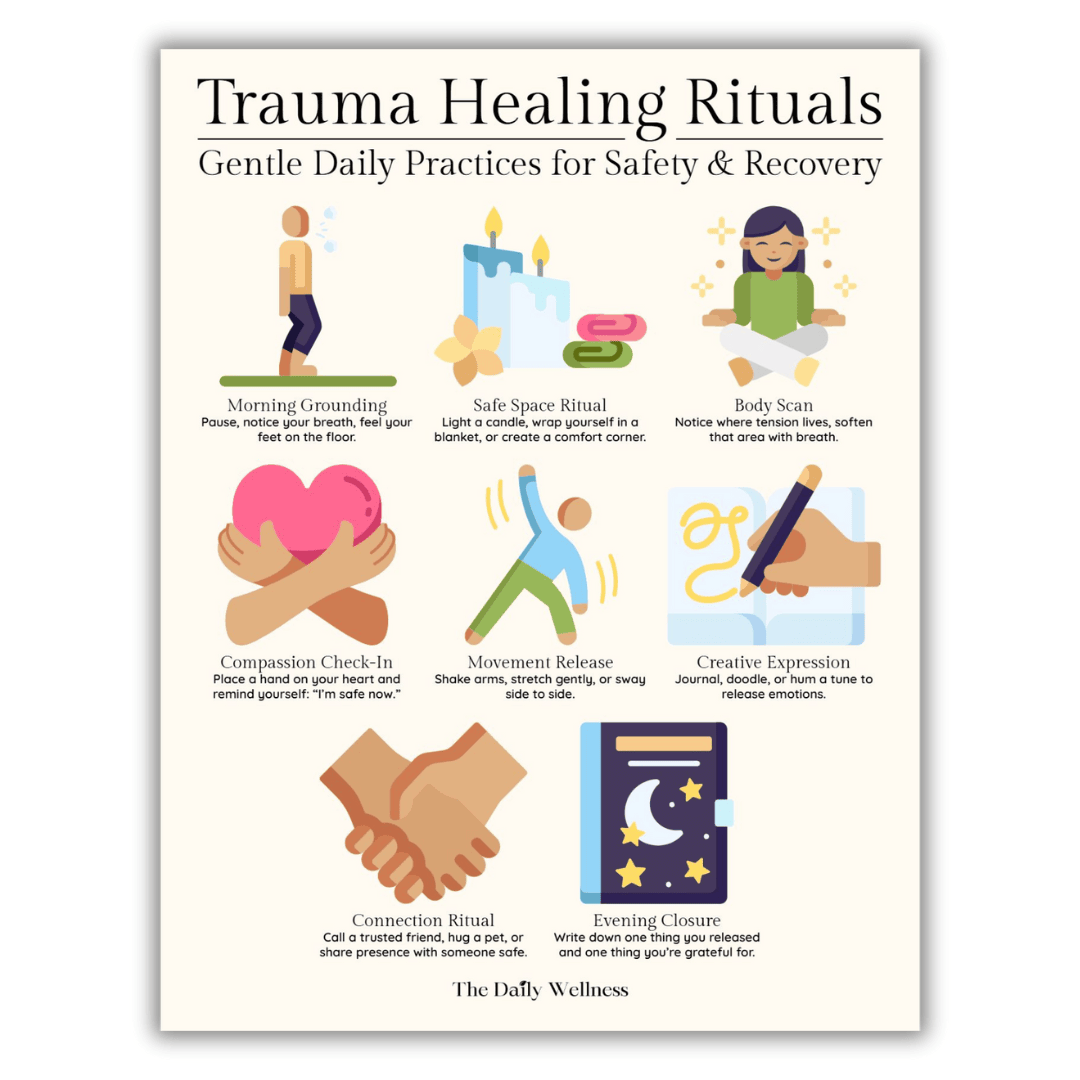
Bring more calm and safety into your day with our free Trauma Healing Rituals Poster. This gentle guide gives you 8 simple daily practices that help your body and mind heal after trauma.
Print it, keep it by your bedside, or save it on your phone as a supportive reminder: healing happens one ritual at a time.
Reply to this email with today’s date (“September 8, 2025”). We’ll send the high-resolution file within 24–30 hours. You can print it at home or at a local shop in any size you prefer.
THERAPIST CORNER
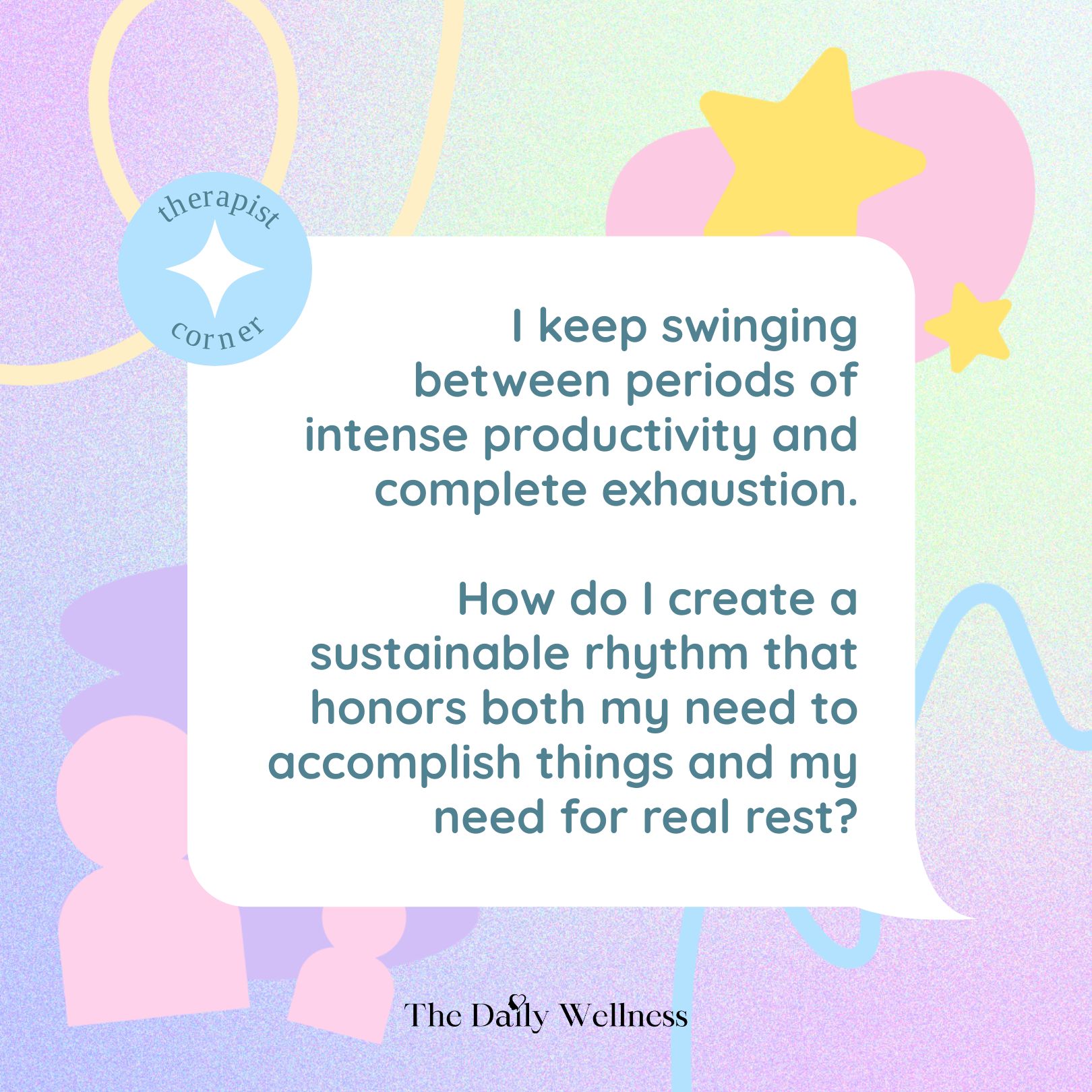
The Response: In a culture that prizes output, it is common to train the body into all-or-nothing modes: full throttle or full stop.
When you push through empty, you’re borrowing energy from your future self; the later crash is your body collecting the debt. Collapse isn’t rest; it’s what happens when rest comes too late.
Real rest is proactive, not a reward. It’s like eating before you’re dizzy: small, steady refuels that keep you from hitting the wall. Many people also have too narrow a definition of both “productive” and “rest.”
Productivity isn’t only visible output; it can be planning, learning, or recovery that enables tomorrow’s work. Rest isn’t only screens on a couch; rest is whatever restores your system.
One small step: Track your energy (1–10) once a day for a week. Note the time of day, what you were doing, and what raised or drained you. Work with your natural peaks; protect your dips.
Try this:
Schedule rest like a meeting (put it on the calendar; keep it).
Match the rest to the need: physical (walk, stretch), cognitive (10 quiet minutes), emotional (call a friend), sensory (dim lights, soft music), creative (sketch, play).
Stop while you still have fuel. Close the laptop at 70–80% instead of running to zero.
Use tiny pit stops: 90-second breath reset; 5-minute outside break; water + light snack.
Set a daily “shutdown cue”: a phrase, song, or routine that tells your brain work is closed.
Aim for rhythm, not perfection. Some days you’ll give more; others, you’ll receive more. The goal is to prevent the extreme highs and lows that leave you depleted and resentful.
Pocket reminder: Sustainable productivity requires sustainable rest. You’re allowed to protect the energy that lets you show up again tomorrow.
TOOL OF THE WEEK
Expressive Writing
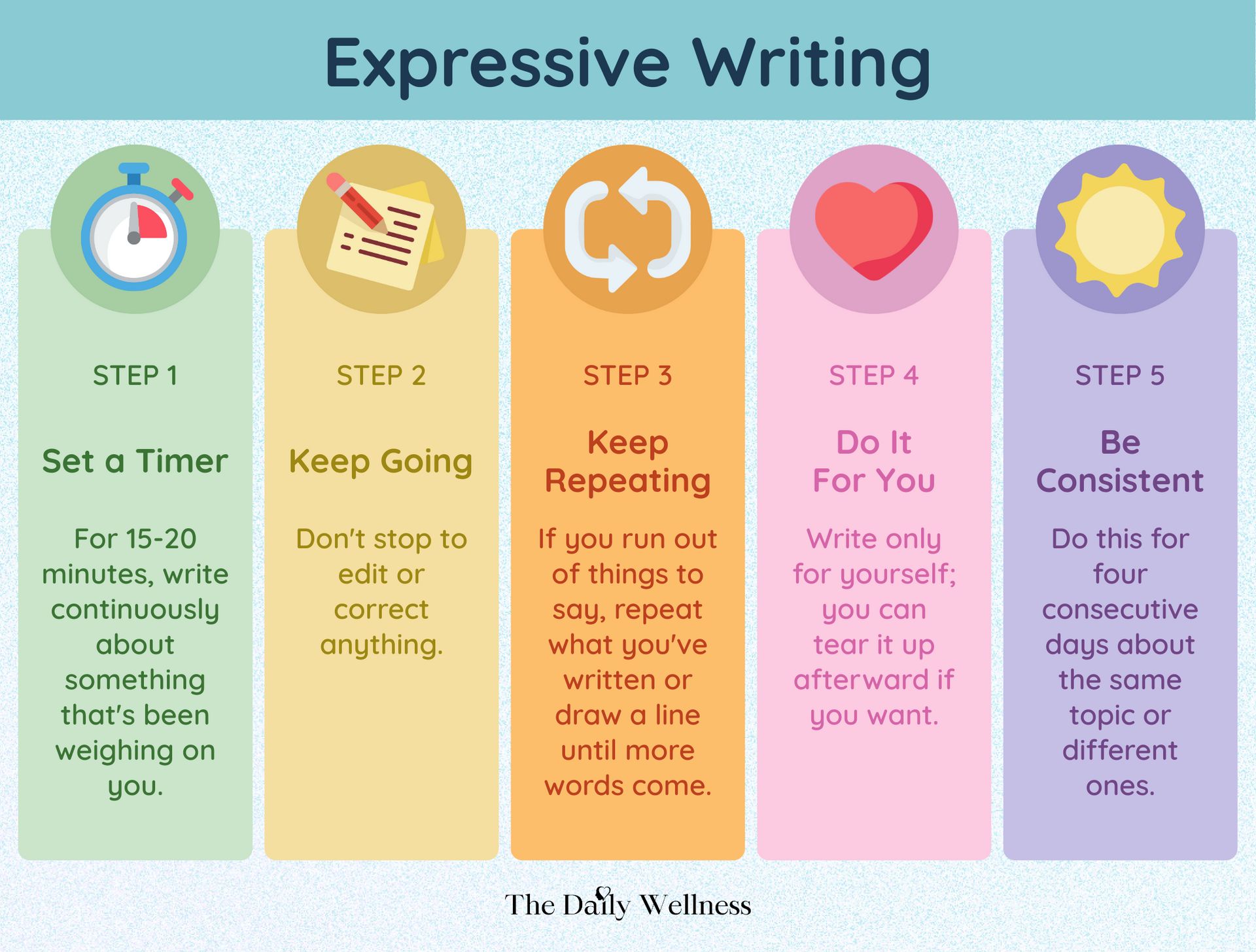
What it is: A simple, private practice where you write for 20 minutes a day for four days about a stressful or painful experience. Write continuously, for yourself only, without worrying about grammar or polish. Think of it as putting feelings into words so your mind can make sense of them.
How to do it:
Pick four consecutive days. Set a 20-minute timer.
Write freely about the most upsetting experience you’re ready to explore. Include thoughts, feelings, memories, and what it means for who you’re becoming.
Keep the pen moving. If you stall, write “I’m not sure what to say” until more arrives.
Decide what to do with it after. Keep, tuck away, or discard. The benefit comes from writing, not from saving it.
When to use it: Helpful after losses, transitions, conflict, or when old memories keep intruding. If you’re in acute crisis, newly traumatized, or feel overwhelmed, wait until you have more support. Stop any session that spikes distress and ground yourself (breath, walk, cold water, call a support).
Why it helps: Carrying unspoken stress can keep the body on alert. Turning swirling emotion into language creates a steadier narrative, which often lowers mental load and makes room for clarity.
What to expect:
Expect some emotional “afterglow” for an hour or so; plan gentle care afterward.
Write honestly, not perfectly. The benefit is in the process, not the prose.
Notice language shifts over the days—from raw detail toward meaning-making.
Research backing: The original expressive writing studies (Pennebaker, late 1980s) observed health and well-being benefits over time, and later reviews have reported improvements across mood, stress, and some health markers in various groups.
Results vary by person, but the consistent thread is the move from emotional chaos to organized story, which appears to reduce the burden on the nervous system.
SCIENCE SPOTLIGHT
Scientists Finally Map What Happens When Your Mind Goes Completely Blank
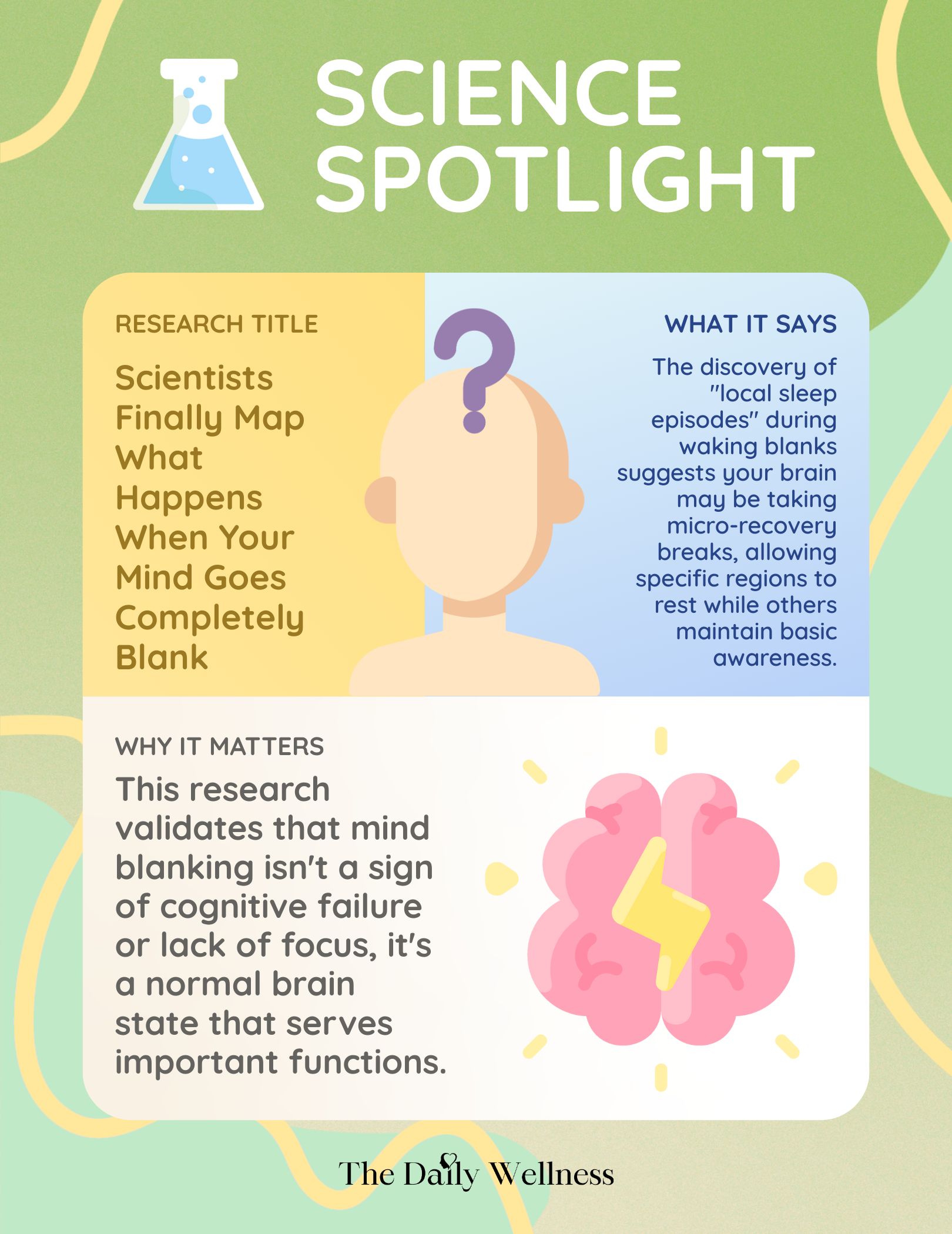
Research finding: An international team reviewed about 80 studies on mind blanking: moments when thoughts feel absent. Across brain-imaging work (fMRI, EEG), mind blanking looked distinct from mind-wandering and was often reported around 5–20% of the time.
Before or during blanks, studies noted lower heart rate and smaller pupils, reduced signal complexity, and, at times, “local sleep” patterns: sleep-like activity in some brain areas while you remain awake. Blanks were more likely at very low or very high arousal.
Why it matters: Mind blanking appears to be a normal brain state, not a failure of focus. It may explain why blanks show up after poor sleep, intense effort, or during long attention tasks.
Clinically, “mind going blank” appears in the diagnostic criteria for generalized anxiety disorder, and blanks are reported more often in some conditions (e.g., ADHD), which may help refine how we understand attention.
Use it today (60–90 seconds):
Name it, don’t fight it: “Blank moment: reset.”
Check state: Am I tired, hungry, or buzzing with stress?
Micro-reset: 5 slow breaths, look at a distant point, stand and stretch, sip water.
Right-size the task: Work in a 15–25 min focus block, then take a 2–5 min break.
Preventive care: Prioritize sleep, daylight, movement, and a real pause between deep-focus blocks.
Pocket reminder: A blank mind is often the brain doing maintenance, not misbehaving. Let the reset finish, then re-enter with one small next step.
MENTAL HEALTH NEWS
US regulators press Big Tech on kids’ mental health risks from AI. The FTC said seven companies must explain how their AI products affect young people’s well-being, data use, and safeguards.
Single-dose LSD shows 12-week benefit for GAD (early data). In a multicenter JAMA trial, one high dose of LSD outperformed placebo for generalized anxiety by the next day and through 12 weeks; low doses looked like placebo. Depressive symptoms also improved, and tolerability was favorable.
Mindset about aging tied to longevity, study suggests. A 15-year study suggests negative views of one’s own aging predicted higher mortality, even after accounting for age, health, and SES. Positive self-perceptions linked to better health and life satisfaction.
DAILY PRACTICE
Today’s Visualization Journey: Neighborhood Repair Café
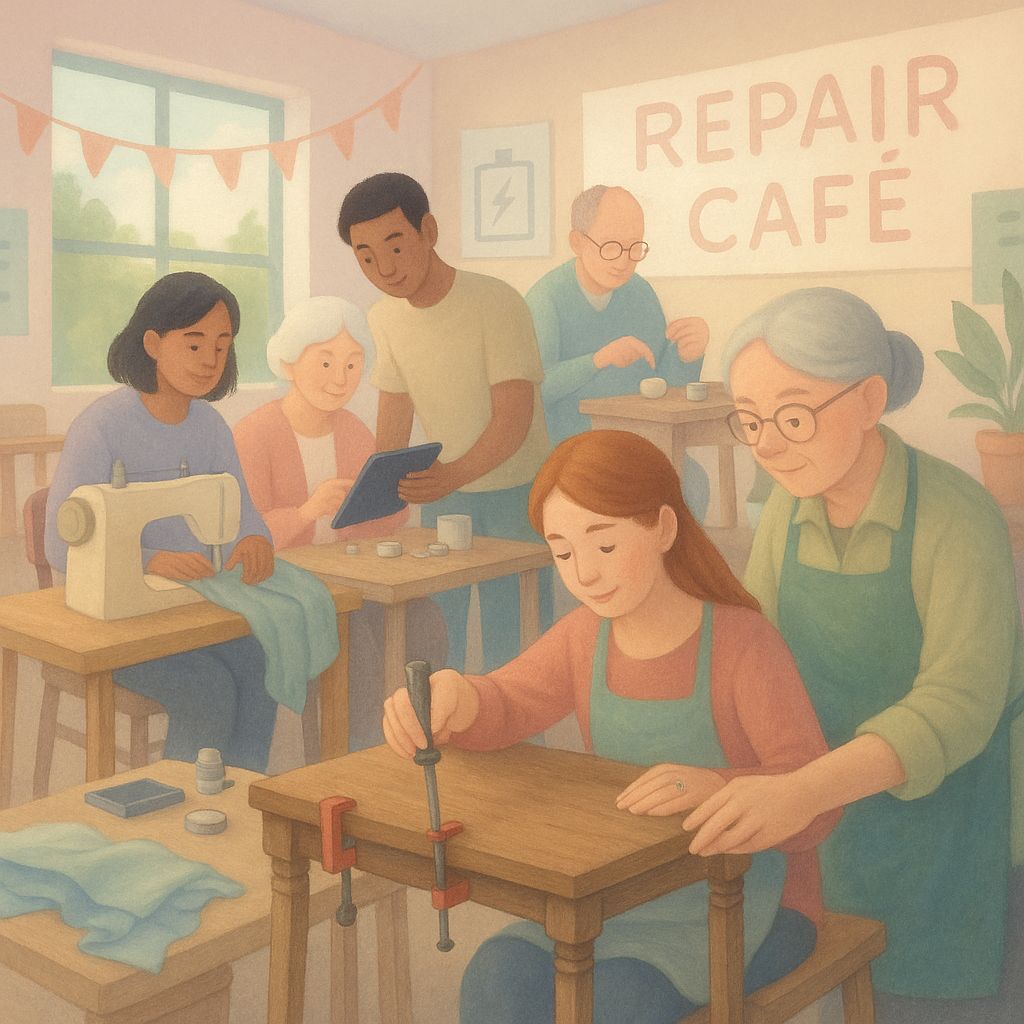
Step into a community center on “repair night.” Tables are set up in small stations: a vintage sewing machine mends a torn cuff, someone swaps a watch battery, and a teen helps an elder troubleshoot a tablet. The room hums with quiet focus and gentle conversation.
You join a volunteer fixing a wobbly table leg. The solution is simple: reinforce the joint, tighten what’s loose. She smiles: “Most things just need a little attention.” The table steadies.
Across the room, people carry out once-broken items made useful again. Let that feeling travel: this week can be about tending what wobbles, not throwing it out.
Make it yours: Name one thing in your life that could use “a little attention.” Pick a five-minute fix and do just that.
Today’s Affirmations
"I can start this week without having to feel enthusiastic about every item on my to-do list."
Some items on the list are necessary, not exciting. You can meet them with steady care rather than forced cheer. Showing up counts.
Try this: When resistance pops up, say: “I don’t have to love this to do it well. I’ll give it a calm, steady effort.” Then set a 10-minute timer and begin.
Gratitude Spotlight
Today's Invitation: "What's one small ritual or routine you've developed that helps transition you between different parts of your day?"
Why It Matters: Transitions can be jarring, especially on Mondays. Tiny, repeated cues tell your body and mind, we’re changing gears now, adding continuity to days that might feel fragmented.
Try This: The next time you do your ritual, slow down for 10 seconds. Notice the before/after in your body, then say quietly, “This helps me shift into what’s next.” Let yourself feel grateful for the structure you’ve created.
WISDOM & CONTEXT
"If you want to go fast, go alone. If you want to go far, go together." — African Proverb
Why it matters today: This wisdom reminds us that while solo efforts might create quick wins, sustainable progress and meaningful accomplishments usually require other people: their support, perspectives, and shared energy.
Bring it into your day: Choose one goal you’re pushing forward. Ask: Where could a partnership make this easier or more durable? Share a next step with someone who cares, ask for a small piece of help, or name how they can support you.
WEEKLY JOURNAL THEME
Your 3-Minute Writing Invitation: "What's one habit I've slipped away from that used to serve me well, and what would it look like to gently reconnect with it?"
Why Today's Prompt Matters: Mondays invite reconnection, not self-blame. Writing about rekindling one supportive habit, without self-judgment about why it faded, can help you approach the restart with compassion rather than pressure.
New to journaling? Start with one honest sentence. There’s no wrong way to do this. Think of your journal as a conversation with yourself, not a performance. Over time, these small notes can help you notice patterns, celebrate quiet wins, and stay connected to the person that you’re becoming.
WEEKLY CHALLENGE
The "Notice What You're Tolerating" Challenge
This week, pay attention to one thing you've been putting up with that's actually draining your energy. Instead of just noticing it again, actually address it this time.
Why it works: Small irritations become background stress. Removing one often frees more energy than you expect, and the fix is usually simpler than the ongoing workaround.
Try this: Start with something concrete and fixable rather than a major life issue. The goal is to practice recognizing what's draining you and trusting that you deserve to live without unnecessary friction, even in small ways.
TODAY'S PERMISSION SLIP
Permission to Not Know What You Want
You’re allowed to feel unsure about your preferences, goals, or direction without forcing quick decisions or pretending to be clear.
Why it matters: Uncertainty is a normal part of growth. Pushing for instant clarity can send you down paths that don’t fit who you’re becoming.
If you need the reminder: Not knowing is information. Sit with it while you learn more about yourself and what feels right for this season.

Tonight's Gentle Review
Invite the day to exhale by asking yourself:
What did I handle with more grace today than I would have last month?
Where did I choose to slow down instead of rushing through something important?
What moment reminded me of my own strength or wisdom?
Release ritual: Place both hands on your heart. Feel its steady beat. Take five slow breaths and let that rhythm remind you: your body has carried you through every challenge.
QUESTION OF THE DAY
"What would I prioritize today if I remembered that my energy is finite and precious?"
Mondays can invite an endless list that assumes unlimited capacity. Treat your energy like a resource to allocate, not something to spend by default.
Hit reply and tell us: what did you release, and how did it feel? We feature a few anonymous responses in future editions, so keep an eye out. You might just see your words helping someone else breathe easier.
WANT TO CONTRIBUTE TO OUR NEWSLETTER?
Are you a therapist, psychologist, or mental health professional with something meaningful to share?
We're opening up space in our newsletter for expert voices from the field — and we'd love to hear from you.
Whether it’s a personal insight, a professional perspective, or a practical tip for everyday mental health, your voice could make a difference to thousands of readers.
👉 Click here to apply to contribute — it only takes 2 minutes.
TUESDAY’S PREVIEW
Coming Tuesday: What to say when your family keeps pressuring you to attend every family event and you need to balance family time with your other commitments without feeling guilty.
MEET THE TEAM
Love what you read? Share this newsletter with someone who might benefit. Your recommendation helps our community grow.
*The Daily Wellness shares educational content only and is not a substitute for professional medical or mental health advice and diagnosis. Please consult a licensed provider for personalized care.